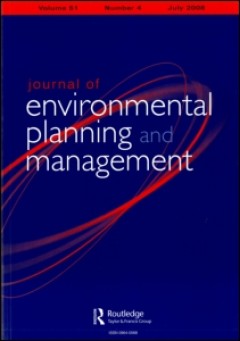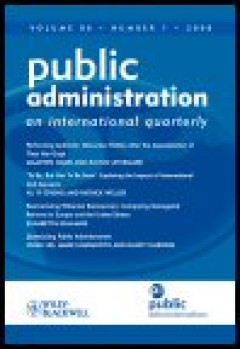Filter by

Does intensity of change matter? Factors affecting adoption of agri-environme…
Agri-environmental schemes (AES) are the main policy instrument currently available in the EU to promote environmentally-friendly farming practices. However, the rate of adoption of these measures is still relatively low in southern Europe, and understanding how these rates can be increased is still an open issue. The goal of this paper is to increase that understanding by testing whether the f…
- Edition
- Volume 53, Issue 7 October 2010 , pages 891 - 905
- ISBN/ISSN
- 09640568
- Collation
- -
- Series Title
- Journal of Environmental Planning and Management
- Call Number
- -

Impact assessment of a hydroelectric project on the flora in the Western Hima…
This study provides an overview of the impacts of a proposed hydroelectric power project in the Western Himalayan region in India, using a primary database on floristic diversity and vegetation analysis. The remote sensing data revealed that in the submergence zone only mixed deciduous forest that occupies 807.5 ha area and has a wood biomass volume of 4,027,503 m3 is likely to be lost due to i…
- Edition
- Volume 53, Issue 7 October 2010 , pages 907 - 923
- ISBN/ISSN
- 09640568
- Collation
- -
- Series Title
- Journal of Environmental Planning and Management
- Call Number
- -

Increasing the public benefits of agricultural conservation easements: an ill…
Agricultural conservation easements (ACEs) involve the significant expenditure of public funds through either tax benefits and/or direct public expenditures. The selection of agricultural parcels for conservation should, therefore, maximise net public benefits to the extent possible within financial constraints and the need for agricultural viability to maintain working landscapes. Some program…
- Edition
- Volume 53, Issue 7 October 2010 , pages 925 - 945
- ISBN/ISSN
- 09640568
- Collation
- -
- Series Title
- Journal of Environmental Planning and Management
- Call Number
- -

Village pubs as a social propellant in rural areas: an econometric study
There is no place like England to witness the role of pubs as a social networking hotspot. Social networks lie at the foundations of most of the social and economic interactions of individuals. The aim of this paper is to assess the importance of pubs as natural locations for the development of social networks and how their presence affects the socio-economic activity of a given area or region.…
- Edition
- Volume 53, Issue 7 October 2010 , pages 947 - 962
- ISBN/ISSN
- 09640568
- Collation
- -
- Series Title
- Journal of Environmental Planning and Management
- Call Number
- -

The Temporal Emotion Work of Motherhood: Homeschoolers’ Strategies for Mana…
Drawing on fieldwork and in-depth interviews with homeschooling mothers in the Pacific Northwest, the author reveals several ways the temporal experience of motherhood was emotionally problematic. The intensive demands of homeschooling left them stressed and dissatisfied with the amount of time they had to pursue their own interests. Mothers tried to allocate their time differently to manage th…
- Edition
- Vol. 24 no. 4, August 5, 2010.pp. 421-446
- ISBN/ISSN
- 08912432
- Collation
- -
- Series Title
- Gender & Society
- Call Number
- -

Working-Class Job Loss, Gender, and the Negotiation of Household Labor
Scholars see the gendered division of household labor as a stronghold of gender inequality. We explore changes in household labor and gender relations when conservative, working-class families experience employment disruptions. Using data from 49 qualitative interviews conducted with men and women following the forced unemployment of breadwinning husbands, we observe some change in gendered hou…
- Edition
- Vol. 24 no. 4, August 5, 2010.pp. 447-474
- ISBN/ISSN
- 08912432
- Collation
- -
- Series Title
- Gender & Society
- Call Number
- -

“Practicing Electoral Politics in the Cracks”:Intersectional Consciousnes…
Previous research on gender and political leadership has narrowly defined gender consciousness, failing to account for the broader commitments, concerns, and loyalties held by women of color. In this article, the author calls for an intersectional approach to analyzing the gender consciousness of political leaders. She presents findings from four months of participant observation in a Latina ca…
- Edition
- Vol. 24 no. 4, August 5, 2010.pp. 475-498
- ISBN/ISSN
- 08912432
- Collation
- -
- Series Title
- Gender & Society
- Call Number
- -

Children’s Surnames, Moral Dilemmas: Accounting for the Predominance of Fat…
This content analysis examines online accounts of choices of marital and child surnames to understand the predominance of exclusively patrilineal surnames. I demonstrate how surnaming processes present the classic tension between commitment to self and others as moral dilemmas of self versus family, children, and spouse. Social and cultural mechanisms create an either/or exclusive framing and a…
- Edition
- Vol. 24 no. 4, August 5, 2010. pp. 499-525
- ISBN/ISSN
- 08912432
- Collation
- -
- Series Title
- Gender & Society
- Call Number
- -

Anticipating Infertility: Egg Freezing, Genetic Preservation, and Risk
This article discusses the new reproductive technology of egg freezing in the context of existing literature on gender, medicalization, and infertility. What is unique about this technology is its use by women who are not currently infertile but who may anticipate a future diagnosis. This circumstance gives rise to a new ontological category of �anticipated infertility.� The author draws on par…
- Edition
- Vol. 24 no. 4. August 5, 2010.pp. 526-545
- ISBN/ISSN
- 08912432
- Collation
- -
- Series Title
- Gender & Society
- Call Number
- -

POWER AND INTERACTIVE POLICY-MAKING: A COMPARATIVE STUDY OF POWER AND INFLUEN…
A number of countries use forms of interactive policy-making to increase the influence of citizens on decision making. Since there has also been an increase in citizen participation in The Netherlands over the last decade, in this paper, we provide a comparative analysis of 8 interactive projects initiated by the Dutch central government. The central aim of the paper is to understand processes …
- Edition
- Volume 88, Issue 3, September 2010, pages 609–626
- ISBN/ISSN
- 00333298
- Collation
- -
- Series Title
- Public Administration
- Call Number
- -

SCHOLARLY COLLABORATION AND PRODUCTIVITY PATTERNS IN PUBLIC ADMINISTRATION: A…
Previous studies have confirmed the interdisciplinary nature of the field of public administration (Mosher 1956; Ventriss 1991; Forrester 1996; Rodgers and Rodgers 2000; Schroeder et al. 2004) and encouraged the exploration of one important indicator of interdisciplinarity: research collaboration. One way that collaboration patterns are explored is through the study of co-authorship among facul…
- Edition
- Volume 88, Issue 3, September 2010, pages 627–648
- ISBN/ISSN
- 00333298
- Collation
- -
- Series Title
- Public Administration
- Call Number
- -

ORGANIZING THE CORE EXECUTIVE FOR EUROPEAN UNION AFFAIRS: COMPARING FINLAND A…
Examining core executive organization for EU affairs in Finland and Sweden, this article uncovers how change agents used European integration deliberately to strengthen their role in the domestic settings through taking control of EU policy co-ordination. In both countries, EU membership was an exogenous factor that enabled the offices of the PM to secure a more powerful position and advance th…
- Edition
- Volume 88, Issue 3, September 2010, pages 649–664
- ISBN/ISSN
- 00333298
- Collation
- -
- Series Title
- Public Administration
- Call Number
- -

ANALYSING CONTRACTUAL ENVIRONMENTS: LESSONS FROM INDIGENOUS HEALTH IN CANADA,…
Contracting in health care is a mechanism used by the governments of Canada, Australia and New Zealand to improve the participation of marginalized populations in primary health care and improve responsiveness to local needs. As a result, complex contractual environments have emerged. The literature on contracting in health has tended to focus on the pros and cons of classical versus relational…
- Edition
- Volume 88, Issue 3, September 2010, pages 665–679
- ISBN/ISSN
- 00333298
- Collation
- -
- Series Title
- Public Administration
- Call Number
- -

PARALLEL, TRANSFER OR COLLABORATION STRATEGY OF RELATING THEORY TO PRACTICE? …
The relationship between theory and practice is essential to �applied sciences' such as public management. However, the current debate on this topic lacks empirical substantiation. Here I develop a methodology for the indication of how the theory-practice gap is actually addressed in a given subfield of management enquiry. I distinguish three archetypal strategies of relating theory to practice…
- Edition
- Volume 88, Issue 3, September 2010, pages 680–705
- ISBN/ISSN
- 00333298
- Collation
- -
- Series Title
- Public Administration
- Call Number
- -

LEADERSHIP STYLE, CRISIS RESPONSE AND BLAME MANAGEMENT: THE CASE OF HURRICANE…
Crisis management research has largely ignored one of the most pressing challenges political leaders are confronted with in the wake of a large-scale extreme event: how to cope with what is commonly called the blame game. In this article, we provide a heuristic to help understand political leader responses to blame in the aftermath of crises, emphasizing the crucial role of their leadership sty…
- Edition
- Volume 88, Issue 3, September 2010, pages 706–723
- ISBN/ISSN
- 00333298
- Collation
- -
- Series Title
- Public Administration
- Call Number
- -

TRACING EXPERIENCES OF NHS CHANGE IN ENGLAND: A PROCESS PHILOSOPHY PERSPECTIVE
For over three decades public services have been the subject of unprecedented change. Nowhere has this been more evident than in the English National Health Service (NHS) where despite the effort expended on change there is growing evidence that such restructuring is largely ineffective. Drawing on a study of culture modification in the English NHS, this paper utilizes Chia's (1999) account of …
- Edition
- Volume 88, Issue 3, September 2010, pages 724–740
- ISBN/ISSN
- 00333298
- Collation
- -
- Series Title
- Public Administration
- Call Number
- -

BEYOND DARK AND BRIGHT: TOWARDS A MORE HOLISTIC UNDERSTANDING OF INTER-GROUP …
Networks are becoming a popular organizational form for structuring human activities. To date, scholars have addressed networks in a variety of fields, including sociology, economics, public administration, criminology, political science, and international security. However, little has been done so far to systematically examine the similarities, differences, and connections between network form…
- Edition
- Volume 88, Issue 3, September 2010, pages 741–763
- ISBN/ISSN
- 00333298
- Collation
- -
- Series Title
- Public Administration
- Call Number
- -

POLITICS BY HEURISTICS: POLICY NETWORKS WITH A FOCUS ON ACTOR RESOURCES, AS I…
Policy network analysis is criticized for being a �heuristic� device, yet �heuristic� methods may be essential to achieve detailed understandings of specific policy outcomes. Rational choice modelling alone cannot perform a similar function. This paper develops a �heuristic� policy network approach that focuses on the analysis of actor resources. Changing contexts can alter the resource distrib…
- Edition
- Volume 88, Issue 3, September 2010, pages 764–781
- ISBN/ISSN
- 00333298
- Collation
- -
- Series Title
- Public Administration
- Call Number
- -

MECHANISMS OF CONFLICT MANAGEMENT IN EU REGULATORY POLICY
In this conceptual article, we explore mechanisms of conflict management in European Union (EU) regulatory policy-making. We build on J.G. March's distinction between aggregation and transformation as the two strategic options to deal with inconsistent preferences or identities that are at the source of social conflict. While this distinction is helpful in mapping conflict management mechanisms…
- Edition
- Volume 88, Issue 3, September 2010, pages 782–799
- ISBN/ISSN
- 00333298
- Collation
- -
- Series Title
- Public Administration
- Call Number
- -

SUPPLIER BEHAVIOUR AND PUBLIC CONTRACTING IN THE ENGLISH AGENCY NURSING MARKET
The worldwide expansion in the use of private firms to deliver public services and infrastructure has promoted a substantial literature on public sector contract and relationship management. This literature is currently dominated by the notion that supplier relationships should be based upon trust. Less prominent are more sceptical approaches that emphasize the need to assiduously manage potent…
- Edition
- Volume 88, Issue 3, September 2010, pages 800–818
- ISBN/ISSN
- 00333298
- Collation
- -
- Series Title
- Public Administration
- Call Number
- -
 Computer Science, Information & General Works
Computer Science, Information & General Works  Philosophy & Psychology
Philosophy & Psychology  Religion
Religion  Social Sciences
Social Sciences  Language
Language  Pure Science
Pure Science  Applied Sciences
Applied Sciences  Art & Recreation
Art & Recreation  Literature
Literature  History & Geography
History & Geography